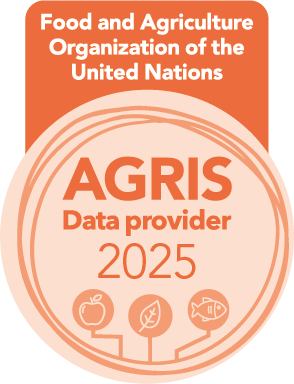A Comparative Analysis Between Two Varieties of Wheat By Means of in-vitro Propagation
Comparison B/W 2 Varieties of Wheat by in-vitro Propagation
DOI:
https://doi.org/10.54393/df.v2i2.22Keywords:
wheat, callogenesis, PGR, in vitro, embryoAbstract
With increasing population, world is facing a decrease in food production and increase in huger. Scientist and researchers are now trying to developing techniques to isolate the high yield varieties of staple food crops and enhance the cropping structure. In this study two varieties of wheat (T. aestivum L.) are selected and made a comparative analysis of them is carried out by making callus culture. Callus culture will give the idea about growing capabilities of each variety. Methods: In vitro propagation technique is used to induce callogenesis with the help of PGR. Auxin is used as a PGR, whereas embryos were explants used for the experiment. The experiment is divided into these stages: Surface sterilization, Stock solution formation, Media formation, Embryo excision and Frequency of Callogenesis (%). Results: Out of 60 excised embryos 18 and 12 calli were formed for Galaxy-2013-2013 and Faisalabad-2008-2008 respectively. Calli of Galaxy-2013-2013 was visible after 8 days and calli of Faisalabad-2008 were visible after 14 days. The frequency of callogenesis of both varieties was found to be 30 and 20% respectively. Conclusion: Both varieties of wheat can be cultivated on large scale and are able to generate greater yields as compared to other wheat varieties.
References
Babcock BA, Massaro TM, Spaulding NW, Gilles ME. Civil Procedure: Cases and Problems. Wolters Kluwer; 2021 Apr 28.
García-Gonzáles R, Quiroz K, Carrasco B, Caligari P. Plant tissue culture: Current status, opportunities and challenges. International Journal of Agriculture and Natural Resources. 2010 Sep 1;37(3):5-30.
Wheeler JC. The World Food Crisis: Population, Food, and Environmental Issues as They Affect Pakistan. InGenetic Diversity in Plants 1977 (pp. 11-18). Springer, Boston, MA.
Brown AH. The case for core collections. The use of plant genetic resources. 1989 Feb 2:136-56.
Dorosh P, Salam A. Wheat markets and price stabilisation in Pakistan: An analysis of policy options. The Pakistan Development Review. 2008 Apr 1:71-87.
Ahmad J, Anwar J, Owais M, Tanveer MH, Javaid MM. Akbar-2019: A new high yielding and rust resistant bread wheat variety for irrigated areas of Punjab, Pakistan. J. Agric. Res. 2020;58(4):221-7.
McKently AH, Moore GA, Gardner FP. In Vitro Plant Regenation of Peanut From Seed Explants. Crop science. 1990 Jan;30(1):192-6.
Chen JT, Chang WC. Direct somatic embryogenesis and plant regeneration from leaf explants of Phalaenopsis amabilis. Biologia plantarum. 2006 Jun;50(2):169-73.
Gunay AL, Rao PS. In vitro plant regeneration from hypocotyl and cotyledon explants of red pepper (Capsicum). Plant Science Letters. 1978 Apr 1;11(3-4):365-72.
Birsin MA, Ozgen M. A comparison of callus induction and plant regeneration from different embryo explants of triticale (x Triticosecale Wittmack). Cellular and Molecular Biology Letters. 2004 Jan 1;9(2):353-62.
Efferth T. Biotechnology applications of plant callus cultures. Engineering. 2019 Feb 1;5(1):50-59. https://doi.org/10.1016/j.eng.2018.11.006
Pati PK, Rath SP, Sharma M, Sood A, Ahuja PS. In vitro propagation of rose--a review. Biotechnol Adv. 2006 Jan-Feb;24(1):94-114. doi: 10.1016/j.biotechadv.2005.07.001.
Jain SM, Ochatt S, editors. Protocols for in vitro propagation of ornamental plants. Totowa, NJ, USA:: Humana press; 2010 Dec.
Pimentel D. World overpopulation. Environment, Development and Sustainability. 2012 Apr;14(2):151-2.
Shah MI, Jabeen MU, Ilahi IH. In vitro callus induction, its proliferation and regeneration in seed explants of wheat (Triticum aestivum L.) var. LU-26S. Pak. J. Bot. 2003 Jun 1;35(2):209-17.
Nalawade SM, Tsay HS. In vitro propagation of some important Chinese medicinal plants and their sustainable usage. In Vitro Cellular & Developmental Biology-Plant. 2004 Mar;40(2):143-154. doi:10.1079/IVP2003504
Page SR, Monthony AS, Jones AM. Basal media optimization for the micropropagation and callogenesis of Cannabis sativa L. BioRxiv. 2020 Jun 1;1:1-23. doi.org/10.1101/2020.02.07.939181
Akinyosoye ST, Adetumbi JA, Amusa OD, Olowolafe MO, Olasoji JO. Effect of seed size on in vitro seed germination, seedling growth, embryogenic callus induction and plantlet regeneration from embryo of maize (Zea mays L.) seed. Nigerian Journal of Genetics. 2014 Jul 1;28(2):1-7. doi.org/10.1016/j.nigjg.2015.06.001
Lianos T. Steady state economy at optimal population size. the journal of population and sustainability. 2018 Dec 1;3(1):75-99. doi.org/10.3197/jps.2018.3.1.75.
Iqbal MM, Khan I, Chattha MU, Hassan MU, Iqbal M, Farooq M. Performance of Wheat Cultivars Under Different Tillage and Crop Establishment Methods. International Journal of Plant Production. 2021 Nov 5:1-1. doi: 10.1007/s42106-021-00174-0
Downloads
Published
How to Cite
Issue
Section
License
Copyright (c) 2021 DIET FACTOR (Journal of Nutritional & Food Sciences)

This work is licensed under a Creative Commons Attribution 4.0 International License.
This is an open-access journal and all the published articles / items are distributed under the terms of the Creative Commons Attribution License, which permits unrestricted use, distribution, and reproduction in any medium, provided the original author and source are credited. For comments












